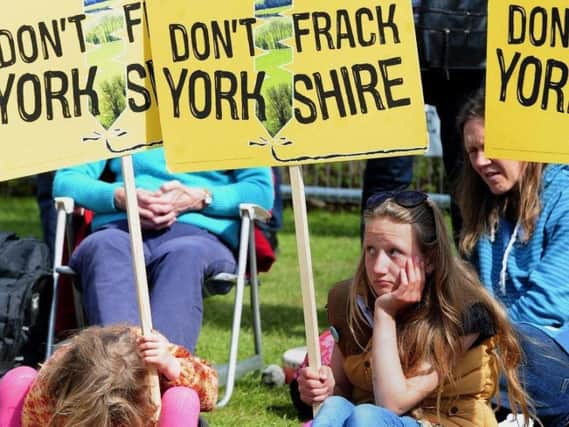Exclusive: Secret Government report questions future of fracking


Parts of the 'Implementation Unit Report on Shale Gas' created in 2016 were made public last month following Freedom of Information requests by Greenpeace, with details that far fewer wells are now forecast to be in operation by 2025 than previously expected leading to suggestions that the potential of the controversial industry has been over-estimated.
Seven gas firms have licences to explore whether fracking is feasible across vast swathes of Yorkshire, with Prime Minister Theresa May telling The Yorkshire Post last month that the process of extracting shale gas from rocks deep underground can reduce the nation’s reliance on imported energy.
Advertisement
Hide AdAdvertisement
Hide AdRother Valley MP Sir Kevin Barron submitted a Freedom of Information request last month asking for the full Cabinet Office report to be made public - a request which has now been rejected.
The five-page response from the Cabinet Office said that while there was a public interest in releasing details as it recognised “decisions ministers make regarding fracking may have a significant impact on the lives of the citizens”, it would be keeping the report private on the grounds of protecting ministerial communications around forming policy, as well as for commercial confidentiality reasons.
The response added: “The British shale gas industry is still an emerging market. Release of information from 2016, even with the passage of time, could call into question the industry’s viability.
Advertisement
Hide AdAdvertisement
Hide Ad“The requested information was classified as confidential and commercially sensitive, and includes confidential commercial information shared with the government by third parties.
“Shale gas exploration is a commercial activity, and disclosure could be detrimental to third parties’ business operations in this market.”
The response added that “there is little in the report that would promote greater public understanding of the industry”.
Sir Kevin, whose constituency in South Yorkshire includes two areas where petrochemicals giant Ineos hopes to conduct exploration work to assess the feasibility of fracking, said today: “It is not acceptable for the Government to refuse to release this report.
Advertisement
Hide AdAdvertisement
Hide Ad"People close to the proposed fracking sites deserve to see all the evidence that the Government has.”
Last month, Greenpeace’s journalism unit Unearthed reported that the Cabinet Office analysis predicts there could be around 155 fracking wells in operation by 2025, with no further information beyond that to date as to the expected roll-out.
That figure calls into question previous industry estimates that 4,000 wells could be in operation by 2032, producing enough gas to supply the equivalent of 20m homes in the process.
No fracking has taken place in the UK since 2011, when earth tremors in Lancashire were found to be result of test drilling.
Advertisement
Hide AdAdvertisement
Hide AdThe start of test-fracking in Yorkshire has been considerably delayed at the most advanced site in Kirby Misperton, Ryedale. Gas firm Third Energy had wanted to start work last year but has now moved equipment off site and said it will not start work until the autumn as it awaits the outcome of a Government review of its finances.
Publishing report 'could affect ministers' candour'
Making the fracking report public would “affect the candour with which officials and ministers express their views on the subject in future”, the Cabinet Office has said.
In response to the Freedom of Information request, the response said: “It is not inconceivable that officials and ministers could become much more conscious of public opinion and thus more circumspect when expressing their views and considering options for fear of how the public might react. That would not be in the public interest.”
A Cabinet Office spokeswoman said: “The Government prepares a number of confidential and commercially sensitive documents for internal discussion and analysis to inform the policy-making process.”